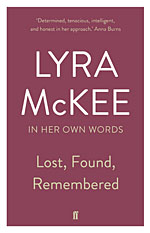 Lyra McKee wrote an article for the Mosaic website in 2016, The Fight of Your Life. It connected boxing and American football with errant behaviour and baseline poverty in Chicago and western Canada. It was about domestic violence and personality swings that were hard to figure.
Lyra McKee wrote an article for the Mosaic website in 2016, The Fight of Your Life. It connected boxing and American football with errant behaviour and baseline poverty in Chicago and western Canada. It was about domestic violence and personality swings that were hard to figure.
The stories may have seemed random but the author led you into the narrative. You trusted her and in time there was a reveal about disposable heroes, mass entertainment and Chronic Traumatic Encephalopathy. Once-excellent athletes had become concussed, paranoid, punch drunk, suicidal.
Lyra built the feature around interviews in Belfast, Illinois and New England. She invited you to hear from the families that had encountered CTE. Then she would pull back the focus for a scientific overview. She added dialogue and dramatic enactments. It was the domain of locker room and ring canvas and unlaundered sweat. The writer wanted you to understand this compelling need to win, earn and transcend, regardless of poor medical supervision and premature death.
In a Boston Veteran’s Hospital, Lyra learnt about brain tissue samples and trauma patterns. This information reached back to the families, explaining the personality changes of loved ones and provided a grim solace. It was also a tough trajectory for the reader, news of a lesser-known syndrome and a literal punchline.
Lyra McKee wrote this story in her mid-twenties. She clearly understood the method behind the best periodical writing. There was extensive research, human sensitivity, imaginative use of dialogue and a tremendous curve of meaning and consequence. Lyra was sympathetic to Tom Wolfe and The New Journalism playbook. She had a kinship to Joan Didion and recent travellers like Malcolm Gladwell. She put in expenditures of time and personal resources. Lyra McKee aspired to great copy and you want to cheer when you see her reaching there.
 Unfortunately, Lost, Found, Remembered is not an expansive book. Lyra’s career ended on April 18 2019 when she died from a paramilitary bullet in the Creggan, Derry. She was 29. And so the title of this compilation reflects the development of a trade that would certainly have delivered more outstanding moments.
Unfortunately, Lost, Found, Remembered is not an expansive book. Lyra’s career ended on April 18 2019 when she died from a paramilitary bullet in the Creggan, Derry. She was 29. And so the title of this compilation reflects the development of a trade that would certainly have delivered more outstanding moments.
There are pieces of juvenilia in this volume that find her aspiring to a style. She’s looking for riffs and themes that correspond to her own locality and context. Lyra was raised in north Belfast into a nominal ceasefire. She became a significant voice for LGBT+ equality. Gentrification started to plump up the city centre, but in the former murder territory around Duncairn, the vacancy of purpose and lasting trauma was horrendously present. So she wrote Suicide of the Ceasefire Babies, again published in Mosaic, about a generational blight and the State that failed them. It is relevant, still.
Lyra mentions the impact of austerity on her own chances. It was probably a bigger problem than she had realised, a rumbling class war that wanted to limit herself and her peers. Likewise, with the decline in journalism as a viable job. She had a passionate calling but this was a sunset industry. In another era, she might have been unloosed by Rolling Stone with a 10,000 word brief and a tidy expense account. You could imagine her at the Algonquin Round Table in New York, or pestering Normal Mailer in the Village Voice offices. But with the advent of clickbait culture, Lyra was on a difficult kind of hustle, sadly undervalued and even creating her own digital platform, The Muckraker, to place the work.
Like other aspects of Lyra’s life, Lost, Found, Remembered is about soaring intent, challenges met and a life interrupted. We lost a good one.
Stuart Bailie
SEE ALSO:
Lyra McKee – Dreams and Responsibilities
Lyra’s Walk – Dig With It account of the Belfast-Derry trek.












 Twitter
Twitter